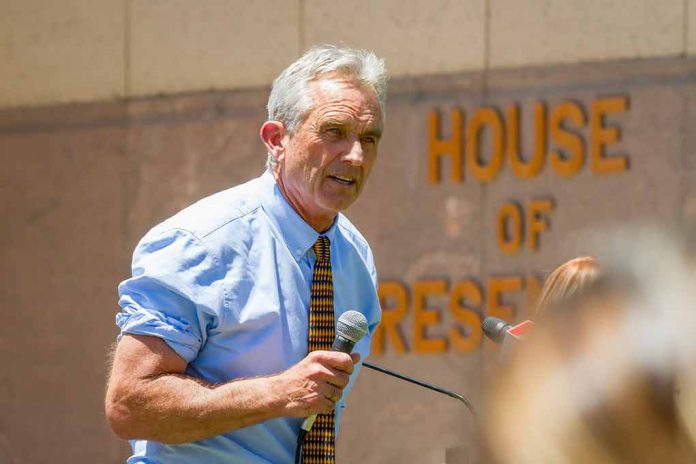
Robert F. Kennedy Jr. envisions a healthcare revolution focusing on children’s health, but the path to his safe and sustainable future is fraught with challenges.
Key Takeaways
- Kennedy advocates for regulatory reform to minimize corporate influence in healthcare.
- He emphasizes banning harmful additives and GMOs to combat chronic diseases.
- Kennedy pushes for improved vaccine safety with more rigorous testing procedures.
- Environmental toxin reduction is a core component of his public health strategy.
- Kennedy champions transparency and accountability in health-related decision-making.
Kennedy’s Vision for Health Care Reform
Robert F. Kennedy Jr. seeks to reform U.S. healthcare by reducing the corporate hold over regulatory agencies, notably the FDA. He proposes a restructuring that prioritizes scientific evidence over corporate interests to ensure public health decisions remain unbiased. His agenda includes banning harmful food additives and genetically modified organisms (GMOs), which he links to rising chronic disease levels among children in the United States.
Kennedy’s focus on child health involves examining vaccine safety and the processes surrounding approval. Rather than an outright opposition, he demands stringent testing and transparency to assuage public concerns. His leadership targets health policy transformation, ensuring prevention and innovation take precedence in safeguarding future generations.
Environmental Toxin Reduction
Reducing environmental toxins is crucial in Kennedy’s public health strategy. He highlights the dangers posed by toxins found in food packaging, pesticides, and plastics, citing them as major health hazards. Kennedy’s proposals advocate for sustainable and health-conscious food production practices, promoting stricter food safety regulations.
He supports initiatives that promote transparency and corporate accountability in nutrition practices, seeking to overhaul existing systems to ensure decisions are fact-based and consumer-focused. This approach aims to remove potentially harmful components of the food chain and reduce the country’s alarming levels of environmental degradation and chronic diseases.
Nutrition and Preventative Healthcare
Kennedy calls for revitalizing nutrition standards and prioritizing preventive healthcare. With over 60% of American children consuming ultra-processed foods, he argues for improved access to nutritious options as an essential remedy. Reversing poor dietary trends could significantly alleviate the financial impact of preventable diseases and contribute to a healthier population.
To further his commitment to an environmentally conscious healthcare approach, Kennedy champions sustainable and regenerative agricultural practices. His advocacy for reducing harmful agricultural chemicals and policies that incite unchecked corporate gains showcases his broader vision of building a resilient and sustainable future.
Controversy and Industry Influence
Kennedy’s stance, especially on vaccine safety, has sparked controversy yet raises pivotal questions about industry influence on health policies. Despite the debates, his proposals consistently push for a healthcare system where public interests outweigh profit motives, a shift from the current state of affairs.
Kennedy’s vision for evidence-based public health policies embodies transparency and accountability. His efforts underscore the importance of setting a precedent in which innovative, scientifically substantiated approaches guide regulatory bodies, ultimately fostering a healthcare landscape that prioritizes citizen well-being.





